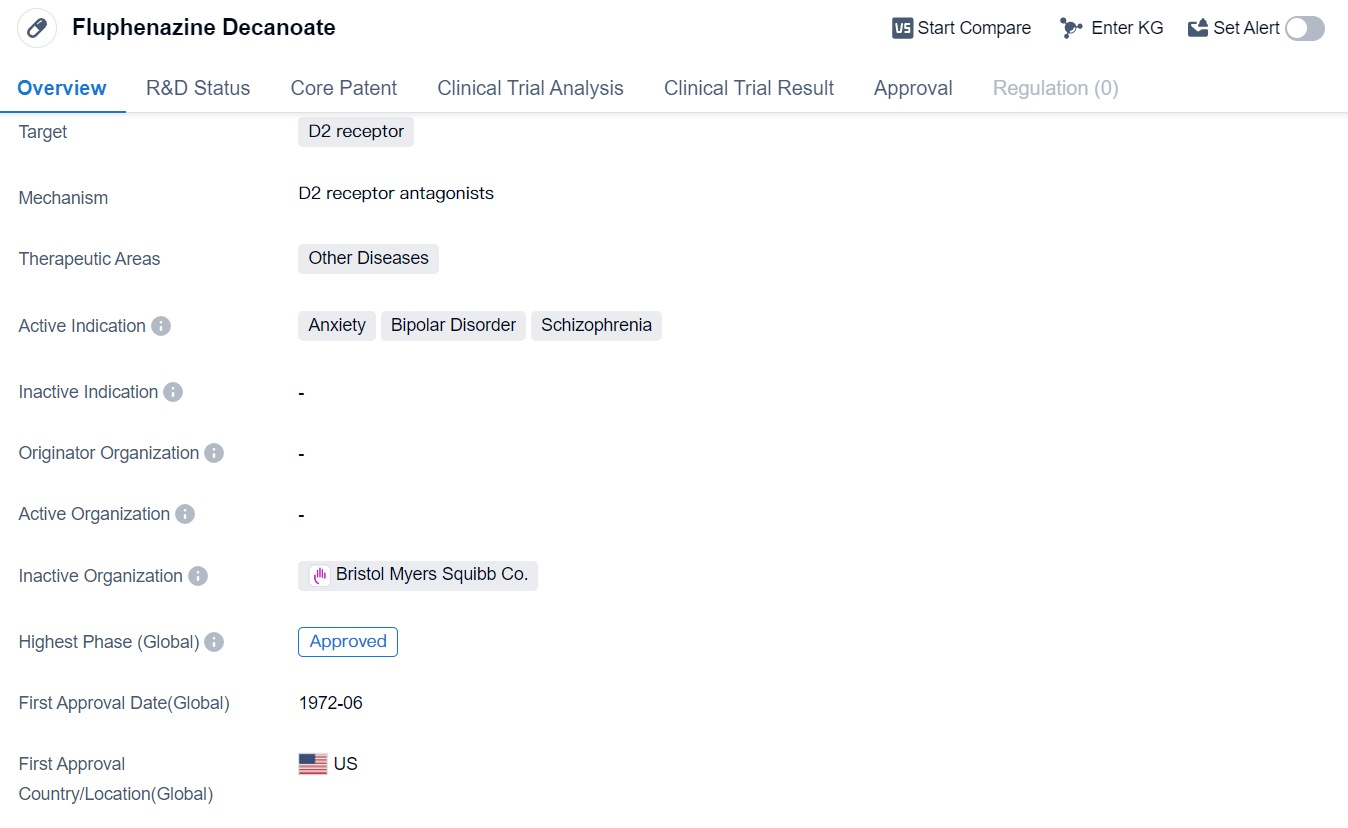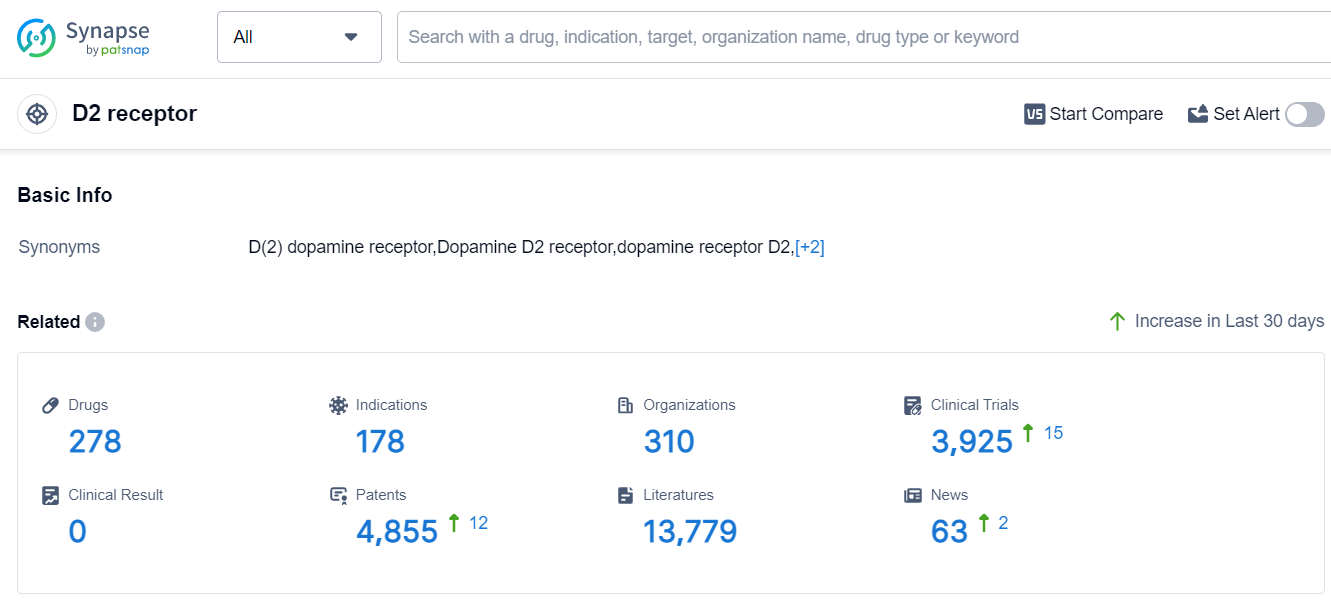Exploring Fluphenazine Decanoate's Revolutionary R&D Successes and its Mechanism of Action on Drug Target
Fluphenazine Decanoate's R&D Progress
Fluphenazine Decanoate is a small molecule drug that primarily targets the D2 receptor. It is used in the treatment of various mental health conditions, including anxiety, bipolar disorder, and schizophrenia. The drug has been approved for use in multiple countries, including the United States, and has been available since June 1972.
Fluphenazine Decanoate belongs to the class of antipsychotic medications known as phenothiazines. It works by blocking the D2 receptors in the brain, which helps to regulate the levels of certain neurotransmitters, such as dopamine. By modulating these neurotransmitters, the drug can help alleviate the symptoms associated with anxiety, bipolar disorder, and schizophrenia.
The drug is primarily indicated for the treatment of schizophrenia, a chronic mental disorder characterized by distorted thinking, hallucinations, and a loss of touch with reality. It is also used in the management of bipolar disorder, a mood disorder characterized by alternating periods of mania and depression. Additionally, Fluphenazine Decanoate is prescribed for anxiety disorders, which are characterized by excessive and persistent worry or fear.
Fluphenazine Decanoate has undergone rigorous clinical trials and has received approval for use in various countries, including the United States. Its approval in 1972 marked its first availability to patients. The drug has demonstrated efficacy in managing the symptoms of anxiety, bipolar disorder, and schizophrenia, making it a valuable treatment option for patients suffering from these conditions.
As a small molecule drug, Fluphenazine Decanoate is likely to have a well-defined chemical structure, allowing for easy synthesis and production. This may contribute to its availability and widespread use in the pharmaceutical market.
👇Please click on the image below to directly access the latest data (R&D Status | Core Patent | Clinical Trial | Approval status in Global countries) of this drug.
Mechanism of Action for Fluphenazine Decanoate: D2 receptor antagonist
D2 receptor antagonists are a class of drugs that act on the D2 receptors in the brain. D2 receptors are a subtype of dopamine receptors, which are involved in the regulation of various neurological functions. Antagonists are substances that bind to receptors without activating them, thereby blocking the receptor's normal function.
From a biomedical perspective, D2 receptor antagonists are primarily used in the treatment of psychiatric disorders such as schizophrenia. Schizophrenia is associated with an overactivity of dopamine signaling in certain areas of the brain, particularly in the mesolimbic pathway. D2 receptor antagonists help to reduce this excessive dopamine activity by blocking the D2 receptors, leading to a decrease in psychotic symptoms.
By blocking D2 receptors, these antagonists can also have side effects. Common side effects include extrapyramidal symptoms such as muscle stiffness, tremors, and abnormal movements. These side effects are due to the blockade of D2 receptors in the basal ganglia, which is involved in motor control.
Overall, D2 receptor antagonists play a crucial role in the management of psychiatric disorders, particularly schizophrenia, by modulating dopamine signaling in the brain.
Drug Target R&D Trends for Fluphenazine Decanoate
The analysis of the target D2 receptor reveals a competitive landscape in the pharmaceutical industry. Johnson & Johnson, Mitsubishi Chemical Group Corp., Novartis AG, and Sanofi are among the companies with significant R&D progress in this target. The approved drugs for relevant indications include schizophrenia, bipolar disorder, Parkinson's disease, nausea, depressive disorder, and more. Small molecule drugs are the most rapidly progressing drug type, indicating intense competition. The development of drugs for the target D2 receptor is progressing in various countries, including the United States, Japan, China, and the European Union. China, in particular, has shown significant progress in drug development for the target D2 receptor. Overall, the target D2 receptor presents opportunities for further research and development in the pharmaceutical industry.
According to Patsnap Synapse, as of 14 Sep 2023, there are a total of 278 D2 receptor drugs worldwide, from 310 organizations, covering 178 indications, and conducting 3925 clinical trials.
Please click on the picture link below for free registration or log in directly if you have a freemium account, you can browse the latest research progress on drugs, indications, organizations, clinical trials, clinical results, and drug patents related to this target
Conclusion
In summary, Fluphenazine Decanoate is a small molecule drug that targets the D2 receptor and is used in the treatment of anxiety, bipolar disorder, and schizophrenia. It has been approved for use in multiple countries, including the United States, since 1972. The drug's efficacy in managing the symptoms of these mental health conditions makes it an important treatment option for patients worldwide.






